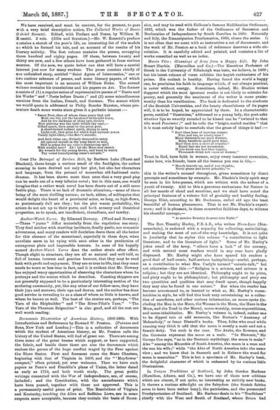We have received, and mast be content, for the present,
to pass with a very brief descriptive notice, The Collected Works of Dante Gabriel Rossetti. Edited, with Preface and Notes, by William M.
resetti. 2 vols. (Ellis and Scrntton.)—Mr. W. Rossettre preface contains a sketch of the poet's life, an interesting list of the models oi which he formed his tale, and an account of the results of his literary activity. The first volume contains the poems, occupying three hundred and eighty pages. Of these, between twenty and thirty are new, and a few others have been gathered in from various sources. Of the new, we quote below one that will have a special interest just now for many readers. The prose consists chiefly of one unfinished story, entitled " Saint Agnes of Intercession," one or two carious schemes of poems, and some literary papers, of which the moat important is an account of William Blake. The second volume contains his translations and his papers on Art. The former consists of (1) a regular series of representative poems of "Dante and his Works" and "Poets before Dante ;" and (2) some miscellaneous versions from the Italian, French, and German. The sonnet which we would quote is addressed to Philip Bourke Marston, whose pre- mature death some weeks since gives it a pathetic interest Sweet Poet, then of whom these years that roll Most one day yet the burdeued birthright learn, And by the darkness of thine eyes discern How piercing was the sight within thy Bout ;— Gifted apart, thou great to the great goal, A cloud-bound radiant spirit, strong to earn Light-raft, that prize for which fond myriads yearn Vainly light-bleat;the Seer's aureole.
And doth thine ear, divinely dowered to eaten All spheral secede in thy song blest so well, Still hearken for my voice's slumbering spell With wistful love Al, I let the Muse now snatch My wreath for thy young brows, and bend to watch Thy veiled transfiguring sense's miracle," Over The Betrayal of Reuben Holt, by Barbara Lake (Hurst and Blanket*, there hangs a curious smell of the footlights, the author eeernieg to have derived not only her plot, but also her characters and language, from the perusal of somewhat old.fashioned melo- dramas. It has been shown more than once that a very good play can be made out of a very inferior novel; but in this case, one would imagine that a rather weak novel has been drawn out of a still more feeble play. There is no lack of dramatic eitnatione,—some of them being of the moat thrilling nature; no lack, either, of soliloquies that would delight the heart of a provincial actor, so long, so high-flown, so portentously dull are they; but the plot wants probability, the actors do not act np to their parts, and both scenery and theatrical properties, so to speak, are insufficient, threadbare, and tawdry.














































 Previous page
Previous page